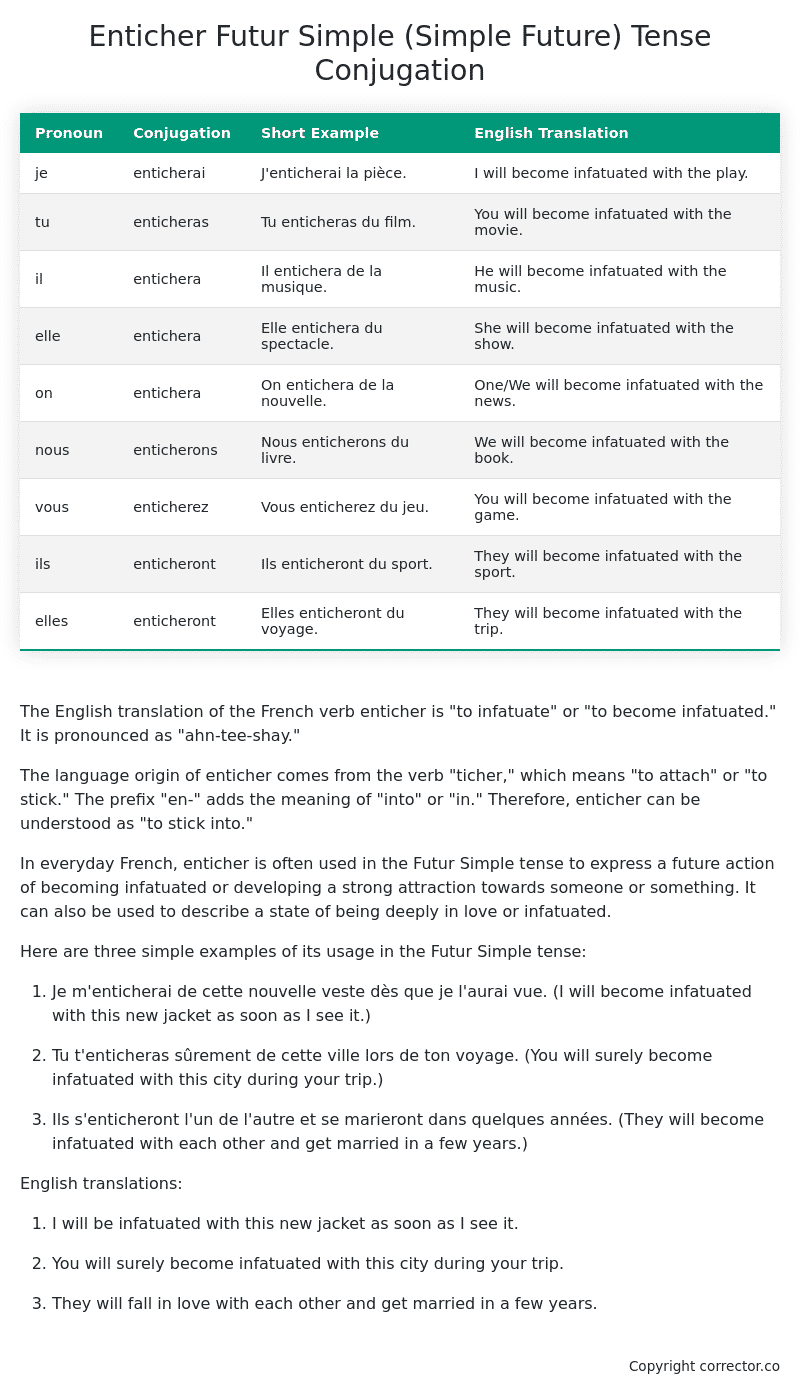Futur Simple (Simple Future) Tense Conjugation of the French Verb enticher
Introduction to the verb enticher
The English translation of the French verb enticher is “to infatuate” or “to become infatuated.” It is pronounced as “ahn-tee-shay.”
The language origin of enticher comes from the verb “ticher,” which means “to attach” or “to stick.” The prefix “en-” adds the meaning of “into” or “in.” Therefore, enticher can be understood as “to stick into.”
In everyday French, enticher is often used in the Futur Simple tense to express a future action of becoming infatuated or developing a strong attraction towards someone or something. It can also be used to describe a state of being deeply in love or infatuated.
Here are three simple examples of its usage in the Futur Simple tense:
-
Je m’enticherai de cette nouvelle veste dès que je l’aurai vue. (I will become infatuated with this new jacket as soon as I see it.)
-
Tu t’enticheras sûrement de cette ville lors de ton voyage. (You will surely become infatuated with this city during your trip.)
-
Ils s’enticheront l’un de l’autre et se marieront dans quelques années. (They will become infatuated with each other and get married in a few years.)
English translations:
-
I will be infatuated with this new jacket as soon as I see it.
-
You will surely become infatuated with this city during your trip.
-
They will fall in love with each other and get married in a few years.
Table of the Futur Simple (Simple Future) Tense Conjugation of enticher
| Pronoun | Conjugation | Short Example | English Translation |
|---|---|---|---|
| je | enticherai | J’enticherai la pièce. | I will become infatuated with the play. |
| tu | enticheras | Tu enticheras du film. | You will become infatuated with the movie. |
| il | entichera | Il entichera de la musique. | He will become infatuated with the music. |
| elle | entichera | Elle entichera du spectacle. | She will become infatuated with the show. |
| on | entichera | On entichera de la nouvelle. | One/We will become infatuated with the news. |
| nous | enticherons | Nous enticherons du livre. | We will become infatuated with the book. |
| vous | enticherez | Vous enticherez du jeu. | You will become infatuated with the game. |
| ils | enticheront | Ils enticheront du sport. | They will become infatuated with the sport. |
| elles | enticheront | Elles enticheront du voyage. | They will become infatuated with the trip. |
Other Conjugations for Enticher.
Le Present (Present Tense) Conjugation of the French Verb enticher
Imparfait (Imperfect) Tense Conjugation of the French Verb enticher
Passé Simple (Simple Past) Tense Conjugation of the French Verb enticher
Passé Composé (Present Perfect) Tense Conjugation of the French Verb enticher
Futur Simple (Simple Future) Tense Conjugation of the French Verb enticher (this article)
Futur Proche (Near Future) Tense Conjugation of the French Verb enticher
Plus-que-parfait (Pluperfect) Tense Conjugation of the French Verb enticher
Passé Antérieur (Past Anterior) Tense Conjugation of the French Verb enticher
Futur Antérieur (Future Anterior) Tense Conjugation of the French Verb enticher
Subjonctif Présent (Subjunctive Present) Tense Conjugation of the French Verb enticher
Subjonctif Passé (Subjunctive Past) Tense Conjugation of the French Verb enticher
Subjonctif Imparfait (Subjunctive Imperfect) Tense Conjugation of the French Verb enticher
Subjonctif Plus-que-parfait (Subjunctive Pluperfect) Tense Conjugation of the French Verb enticher
Conditionnel Présent (Conditional Present) Tense Conjugation of the French Verb enticher
Conditionnel Passé (Conditional Past) Tense Conjugation of the French Verb enticher
L’impératif Présent (Imperative Present) Tense Conjugation of the French Verb enticher
L’infinitif Présent (Infinitive Present) Tense Conjugation of the French Verb enticher
Struggling with French verbs or the language in general? Why not use our free French Grammar Checker – no registration required!
Get a FREE Download Study Sheet of this Conjugation 🔥
Simply right click the image below, click “save image” and get your free reference for the enticher Futur Simple tense conjugation!

Enticher – About the French Futur Simple (Simple Future) Tense
Formation of Futur Simple
For regular -er verbs (e.g., parler – to speak)
For regular -ir verbs (e.g., finir – to finish)
For regular -re verbs (e.g., vendre – to sell)
Common Everyday Usage Patterns
Conditional Statements
Interactions with Other Tenses
Futur Antérieur
Conditional
Present
Summary
I hope you enjoyed this article on the verb enticher. Still in a learning mood? Check out another TOTALLY random French verb conjugation!


